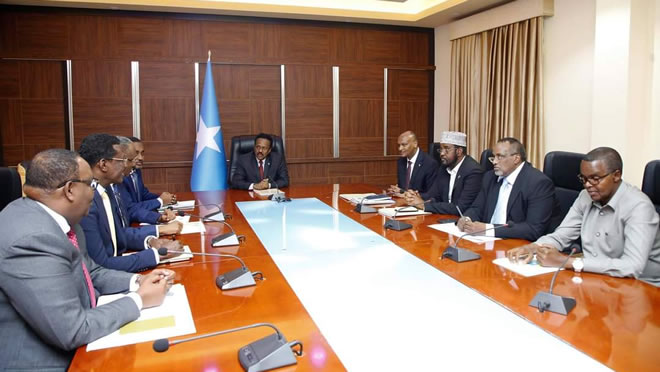by Mohamed Ibrahim
Friday, March 19, 2021

Once you look and assess the Somali election stalemate, the mistrust and lack of shared vision for Somalia between the FGS and FMS, you can begin to realise what is at play is far greater and deep seated. It is unfortunate, but today we have political leaders across Somalia who lack imagination, leadership and clarity of purpose for Somalia – and have become accustomed to self-interest and the politics of the belly. Assessing deeper, you also realise there is no competition for ideas and vision for Somalia beyond few slogans and political theatre.
Most have individualised politics for their own gain without over-arching political purpose, clarity and conviction. Now they want to be remembered (only) for holding the highest office in the land without having the necessary political skills, experience and statecraft to envision a better Somalia. What we have is a competition of misplaced egos emboldened by 4.5 tribal formula. This has given rise to a political environment where we do not have a political class/elite.
I have recently had an interesting conversation with a Somali intellectual and academic in Nairobi, Kenya. In his assessment, he informed me, once you dig deeper and assess Somalia’s civil service history, you find that most of our resources and skills were spent on the field of engineering, trades, teaching, often students being sent to abroad through government sponsorship schemes in partnerships with the then Soviet Union and East Germany. He continues, we never produced social scientist in the area of politics, economics, psychology, social policy and anthropology – a problem solving disciplines that can be helpful in conflict resolution and reconciliation efforts. From Arta Peace Conference 2001 to Dhusamareeb 3 2021, we are still in the political doldrums with no consistent stability and political road map for Somalia.
From the above observation, it is not difficult to see why. The lack of leadership, political instability and chaos we are witnessing today plays into larger picture about the nature and knowledge gap we have in our politicians and political discourse.
To go further, there is also another phenomenon at play and to illustrate this, I will borrow the foresight of a young Palestinian student who I met while I was graduate student. It was in the run up to the Iraq Gulf War of 2003 under the pretext of “war on terror”. Many of us students assembled during a cold February day in 2003 to take part in the anti- Iraq war demonstration to the UK Houses of Parliament with placards, such energy and determination only available to young students. I approached my Palestinian friend and asked him to join us for solidarity and for the cause of peace. After several minutes of persuasion, he declined and said to me something I will never forget and that is relevant in Somalia today. His exact words fail me, but the context and clarity behind his refusal was clear. With purpose and skilful delivery, he said Saddam Hussein grew up within Iraqi society and whether he is militarily removed or not, it would not make any difference. The next president or political leaders will be the same if not worst because fundamentally there is something deeply wrong with Iraqi society and on current trends, they will still be in turmoil with Saddam Hussein or otherwise. It seems he saw the future, because the next act, President Nouri Maliki was no better.
As I contemplate Somalia’s political problems, I remember this encounter with my friend and if I could borrow his compelling narrative, you will find our political leaders grew up in our own societies and environments – and by extension they are part and parcel of our problems.
Our solutions for our instability and chaos requires not just political ideas but fundamental reform in our own societies who directly/indirectly fuel tribalism, extremism, criminality and mistrust at grassroots level. Our politicians are not aliens from outer space but are prism into our self as society.
Somalia is at crossroads. I have message of hope and encouragement for the young generation in Somalia blighted by lack of opportunities, knowledge, safety and material good. Their last 30 years has been wasted and ruined by the current political process and entities. They should not allow the next 30 years to be shaped by inept leaders who are after nothing beyond self-interest and massage of egos.
Young people should mobilise themselves, home and abroad to forge a new chapter for Somalia, a blueprint for change. Get out of Tiktok, Facebook, Clubhouse and Instagram - and start a movement that is formidable and meaningful. Doing otherwise, recycling same ideas/people and leaving the field to our incompetent politicians and extremist (today), is proving costly in lives, dignity, aspirations and livelihoods. The time is now to reform our place in the world and beyond.
Mohamed Ibrahim BA/MSc, London School of Economics and Political Science, is a keen writer and social campaigner, London based, He can be reached via @Mi_shiine Email: [email protected]